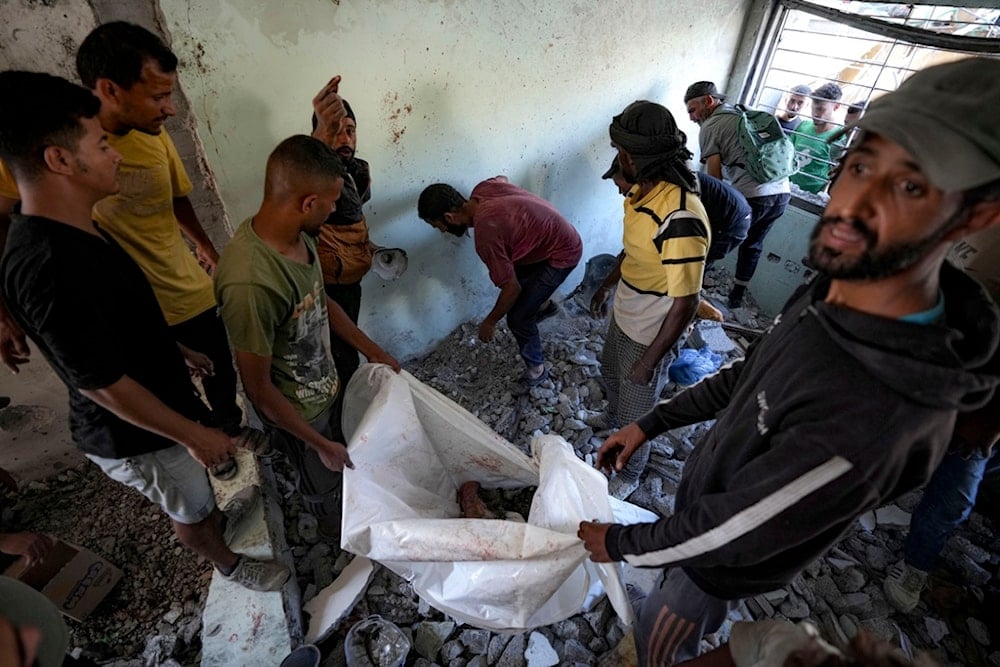American Historical Association condemns Israeli scholasticide in Gaza
The American Historical Association, the country's leading body of historians, voted to condemn the Israeli aggression on Gaza's education system.
-

Palestinians search for the remains of their relatives killed in an Israeli bombardment of a school in Deir al-Balah, central Gaza Strip, on Thursday, October 10, 2024. (AP)
The American Historical Association (AHA), the largest professional organization of historians in the United States, passed a resolution on Sunday condemning the Israeli occupation's military actions in Gaza, describing the widespread destruction of educational infrastructure, archives, and libraries as scholasticide.
The resolution was approved during the AHA's annual meeting in Manhattan, attended by nearly 4,000 of its 10,000 members. The measure passed by a vote of 428 to 88, following intense debate. Some senior leaders of the association had reportedly opposed the resolution.
On Monday, the resolution advanced to the AHA's elected council, which has the authority to endorse, veto, or decline to act on it. A decision to defer would send the measure to the full membership for ratification within 90 days. Executive Director James Grossman stated that the council engaged in "vigorous discussion" but postponed its decision until its next meeting in the coming weeks.
The resolution, introduced by Historians for Peace and Democracy, calls for a permanent ceasefire and urges the formation of a committee to assist in rebuilding Gaza's educational infrastructure.
The resolution argues that the Israeli military campaign has "obliterated Gaza's education system," claiming the destruction of 80% of schools, all 12 universities, and numerous cultural institutions, including archives and museums. These actions, it states, jeopardize the future study of Palestinian history. The resolution cites a United Nations report from April 2024, which characterized the Israeli occupation's attacks as "scholasticide".
Schools, children suffering
Barbara Weinstein, a former AHA president and professor of Latin American history at New York University, supported the resolution. She highlighted the organization's history of opposing military actions, including the Iraq and Ukraine wars.
"Not only is this a protest against an attack on Gaza that has killed many people and destroyed many buildings, it's a protest against the erasure of their memory. And for historians, the erasure of people's memories is the erasure of the people," Weinstein stated after the vote.
Schools in Gaza have been closed for over a year due to the outbreak of war. The ongoing Israeli aggression has severely impacted educational infrastructure in Gaza, with 76% of schools in the Strip suffering direct damage from targeted attacks, as per a report by the Global Education Cluster.
Amid the genocide, many children in Gaza are caught up in their families' daily struggle for survival. They walk barefoot on dirt roads to transport water from distribution points to their families residing in tent cities, which are overcrowded with Palestinians forcibly displaced from their homes. Others line up at charity kitchens with containers to collect food, AP reported.
Future of Gaza at risk
Humanitarian workers warn that the prolonged lack of education poses a serious risk of long-term harm to Gaza’s children.
Tess Ingram, regional spokesperson for UNICEF, the United Nations agency for children, said, “The longer a child is out of school, the more they are at risk of dropping out permanently and not returning.”
Gaza’s 625,000 school-age children have already lost nearly a full year of education. It remains uncertain when they will be able to return to school, as the ceasefire negotiations reached an impasse which is due to the occupation's continued refusal to withdraw from the area during the first phase of the agreement.
Approximately 1.9 million of Gaza's 2.4 million residents have been forcibly displaced from their homes. They are now living in expansive tent camps that lack basic water and sanitation facilities or in UN and government schools that have been repurposed as shelters.

 4 Min Read
4 Min Read








